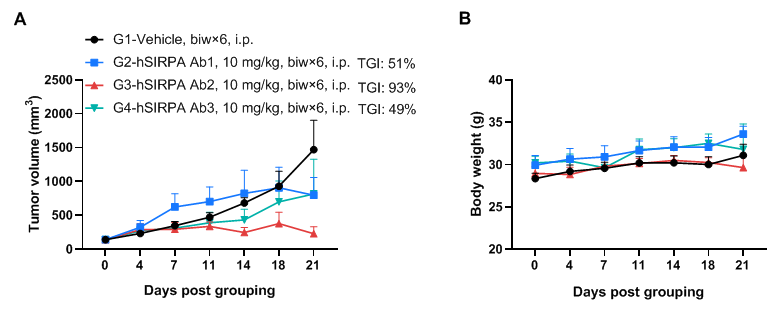B-hSIRPA mice
| Strain Name |
C57BL/6-Sirpatm1(SIRPA)Bcgen/Bcgen
|
Common Name | B-hSIRPA mice |
| Background | C57BL/6 | Catalog number | 110016 |
|
Aliases |
Sirpa (signal-regulatory protein alpha) |
||
|
NCBI Gene ID |
19261 |
||
mRNA expression analysis

Strain specific analysis of Sirpα gene expression in WT and B-hSIRPA mice by RT-PCR. Mouse Sirpα mRNA was detectable in splenocytes of wild-type (+/+) mice. Human SIRPα mRNA was detectable only in H/H but not in +/+ mice.

Species specific SIRPα expression analysis in B-hSIRPA mice by flow cytometry. Splenocytes were collected from WT and homozygous B-hSIRPA (H/H) mice stimulated with anti-CD3ε in vivo and analyzed by flow cytometry with anti- SIRPα antibodies. Mouse SIRPα was detectable in WT mice. This anti-mouse SIRPα antibody also cross reacts with human SIRPα. Human SIRPα were exclusively detectable in homozygous B-hSIRPA mice but not in WT mice.

Antitumor activity of anti-human SIRPα antibodies in B-hSIRPA mice. (A) Anti human SIRPα antibodies inhibited MC38-hCD47 tumor growth in B-hSIRPA mice. Murine colon cancer MC38-hCD47 cells (5×105) were subcutaneously implanted into homozygous B-hSIRPA mice (male, 9-week-old, n=6). Mice were grouped when tumor volume reached approximately 150mm3, at which time they were treated with three anti-human SIRPα antibodies with doses and schedules indicated in panel. (B) Body weight changes during treatment. As shown in panel A, anti-human SIRPα antibodies were efficacious in controlling tumor growth in B-hSIRPA mice, demonstrating that the B-hSIRPA mice provide a powerful preclinical model for in vivo evaluation of anti-human SIRPα antibodies. Values are expressed as mean ± SEM.












 京公网安备:
京公网安备: